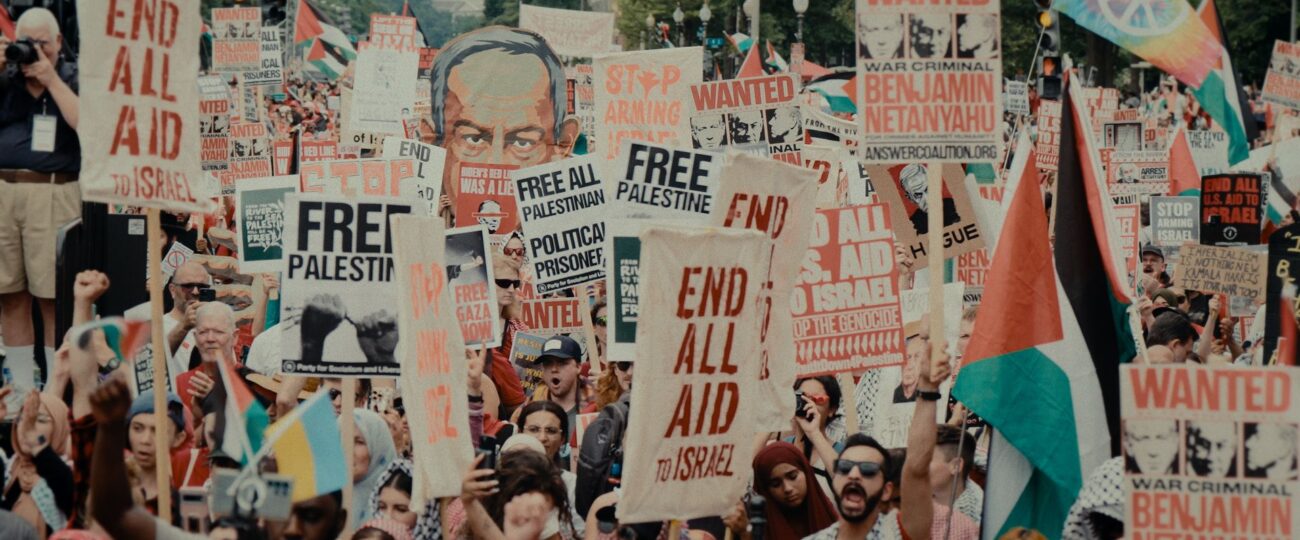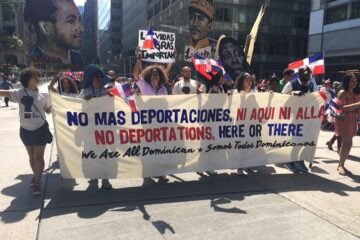Nasreen Abd Elal is a member of the Palestinian Youth Movement (PYM) in New York City, United States. PYM is a transnational grassroots movement of Palestinian and Arab youth in exile, organizing together for the liberation of Palestine from Zionism. “As PYM, we’re based mostly in the far diaspora in countries like the United States, Italy and in the UK. One of our key roles is organizing against Western complicity in Zionism and in the oppression of Palestinians. We are uniquely positioned as Palestinians based here in the U.S. and in similar countries to advocate for our people in that way”, she explains.
Since October 7th, 2023, PYM in the United States have organized and participated in strong marches, rallies, occupations, and other actions to denounce the genocide and demand a ceasefire. This interview was conducted in May 16th 2024, in the same week as Nakba day is commemorated and while students and members of PYM were leading an historical occupation of universities in the country. During the interview, Nasreen talked about the current struggle, the meaning of memory to the Palestinian liberation struggle, and the role of women and feminism in it. Listen to the interview in English below.
How the PYM is organizing in the U.S. now? How are you building the struggle since October 7th?
There are so many facets of it. One of our main roles is connecting with and building a community with other Palestinian and Arab youth based here. Especially now, since the start of the genocide, people have become even more activated and wanting to involve themselves in the struggle somehow. So, we see ourselves as trying to provide an infrastructure for doing that and for building a mass movement that can put pressure to stop the genocide. We organize in many different sectors such as unions and the labor sector, and with lots of students.
We see part of our role as trying to provide a reference point and giving people a Palestinian analysis of what’s happening right now. How can they understand politically what they’re experiencing? What is the significance of the role that they can play as being part of a mass movement here? What they can do for Gaza? Part of that is also being able to put forward demands beyond a ceasefire, basically.
Ceasefire is our most urgent goal and it’s the precondition. But, beyond that, what are the goals of the struggle of the Palestinian National Liberation Movement? That includes everything from lifting the siege on Gaza, not only so humanitarian aid can get in, but also because it has been an inhumane blockade that has suffocated Gaza for decades at this point. That being a condition of allowing our people to rebuild, beyond ending the war.
This is tied into our demands to end Western complicity, meaning the U.S. government’s role in basically giving the Zionist government carte blanche to carry out its genocide with impunity. It also extends to aspects of our struggle, such as the role of prisoners in our movement and the demand to liberate all of our political prisoners who are currently in Zionist jails.
In the past seven months, we’ve been working in coalition with a lot of organizations here in New York City, putting together mass mobilizations week to week. We have a volunteer meeting at The People’s Forum every Monday that brings out hundreds of people from around the city to take collective efforts to build this citywide mass pressure movement. We’ve been in it for seven months, and we’re in it for the long haul. We understand that the ceasefire, when it comes, will only be the beginning of the struggle that we have ahead.
In organizing a youth movement with a struggle that has been on for so long, the role of memory, the meaning of the past, the leaders, and martyrs must be very important. How is the memory of the Palestinian struggles connected to what’s happening right now?
For us the Nakba is not just a very sad event that we commemorate as something that happened to us in the past. Nakba day is a reminder that our Nakba is ongoing. The Palestinian catastrophe was, and is an ongoing structure that still affects us, an ongoing genocidal project. That has manifested in the Israeli State that was premised on the mass expulsion of Palestinians, and that same project is ongoing.
What we’re seeing now with the genocide in Gaza isn’t the start of a new chapter or a new genocide. It’s an unprecedented escalation, but it’s more so an acceleration and a compression of what’s been happening for the past 76 years.
However, there’s an issue with starting history in 1948 with the Nakba, and what gets lost in that is the history of Palestinian resistance to British colonialism and Zionism that preceded it. The Nakba was, in a sense, a reaction to the tenacity of the Palestinian resistance, whether it was the resistance in the 1920s or the peasant revolution of the 1930s. The approach that the Zionist project took in terms of using terrorist militias to drive out hundreds of thousands of Palestinians was a response and a reaction to Palestinians’ refusal to submit to their own dispossession.
I think, similarly, what we’re seeing in Gaza now is that there can be a bit of a tendency to put everything into a humanitarian victimhood framework to look at the genocide as this atrocity that’s happening, but as something detached from Gaza’s historical role as the incubator of our struggle. That’s where the most tenacious resistance has emerged from, and the conditions of this genocide are inseparable from the fact that Gaza resists and refuses to submit to its oppression.
The history of the Palestinian struggle have to do with the radicalism and steadfastness of Palestinian women. Right now, with them being the most affected group in the current war, how do we bring a feminist perspective to the current context?
Women have always been on the front lines of the Palestinian struggle and have always had an essential role to play, whether that was the General Union of Palestinian Women in the Palestine Liberation Organization (PLO) to today with the Union of Palestinian Women’s Committees (UPWC). Of course, in Gaza with the genocide, we see all the ways in which the vulnerabilities that women are exposed to are just exacerbated. It is not only the bombardment and the genocide itself, but also the genocidal conditions that are created, in terms of access to things like personal hygiene, menstrual health products, the particular suffering experienced by breastfeeding women who are malnourished and therefore can’t properly provide for their children. So there’s obviously a very gendered aspect to the current war and how wars disproportionately affect women, children, the elderly, etc.
In PYM, in terms of our analysis of the national liberation struggle, we use the concept of the popular cradle, this idea that the revolution is literally cradled and sustained by the masses that it’s embedded within. This is fundamentally about the social and reproductive labor that goes into sustaining the Palestinian resistance. That’s a very kind of classically feminist framework, the recognition of the importance of reproductive labor in the nursing and sustaining of the Palestinian capacity to resist. Women play an outsized role in that sustenance, whether within the family itself, but also within the broader society.
There’s another side to it that is very important from the feminist angle, which is the dehumanization of Palestinian men and the effort to distinguish women, children, and the elderly from Palestinian men who are always seen as potential threats, potential fighters, not worthy of life. That appear in the way that the Zionist military will basically classify all men that are of age that they kill as potential combatants, for example. This dehumanization also extends to what we’re seeing in terms of the black site death camps that Palestinian men are being rounded up and taken to. This obviously has resonances with things like Abu Ghraib in terms of the use of sexual torture on men, under this idea that Palestinian Arab men are uniquely vulnerable to the use of sexual torture and sexual humiliation. For us, that’s a feminist issue, as part of how these colonial patriarchal structures affect the whole of our society.
In thinking of feminism as a struggle to change the entire system, and the struggle for peace being one of the important aspects of it, how do you see the future being?
Our struggle and the feminist struggle are embedded in one another. In the case of the Palestinian Revolution, they can’t be separated. And I think for a lot of people, particularly in America, we’re used to thinking of struggles as a single issue thing. So, there’s feminism, and there’s racial justice, and there’s climate justice. For a lot of people, that makes it hard for them to recognize Palestine as a feminist struggle, because it often isn’t necessarily always explicitly spoken of as one. But for us, women’s liberation is folded into this broader struggle.
For Palestinian women, there is no liberation from patriarchy without liberation from Zionism. That project of national liberation is what will allow us to one day resolve the social conditions experienced by women and other gender marginalized people in our society.
That framing is important, because it also shows us how Palestine is also an ecological issue, even if it’s not necessarily being talked about in the kind of traditional framework of climate justice, for example. And it’s the same with feminism. The thing that will liberate Palestinian women is our struggle for self-determination, our struggle for land, our struggle for dignity. And that is what provides us with the literal fertile ground to pursue the full emancipation of ourselves as women and as Palestinians.




